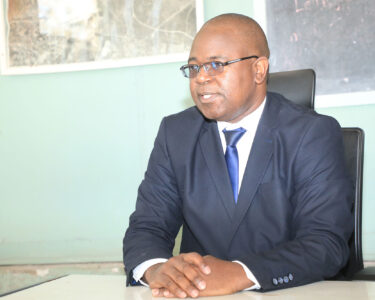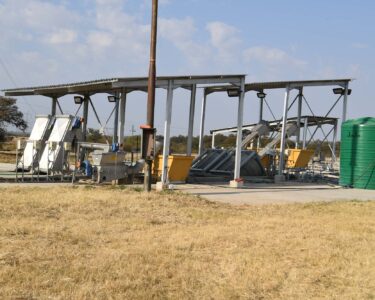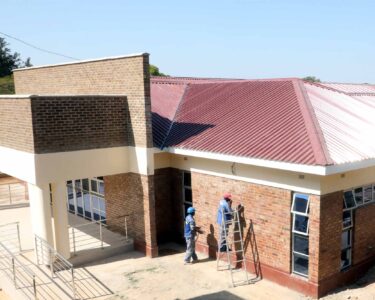… Locals are happy that power cuts now are a thing of the past
Three Zimbabwean diasporans have banded together in Guruve to show how sons of the soil can help the Second Republic to solve some of the nation’s difficult issues, like electricity. Baffour Ankomah reports.
A few kilometres from Guruve centre lies a 1.2 MW solar park whose impact on the local community has been massive since its commissioning on 31 January 2023. It is not the largest solar plant you will see in Zimbabwe (there are far bigger ones elsewhere), but its significance to the local economy and the way Zimbabwean diasporans can help their country, far outweighs its diminutive size.
Owned by New Sahara Ventures, a company established by three “old boys” of the University of Zimbabwe (UZ) – Brian Chindondondo, Trymore Sharata, and Innocy Ngadya – who went abroad to try their luck after graduation, the solar plant has become a saviour of Guruve in the current climate of load-shedding in the country,
The three men were friends at UZ and after graduation they went abroad to seek greener pastures and expertise. They then regrouped after several years and established the solar park in Guruve as their contribution to the rebuilding of Zimbabwe under the Second Republic.
According to Mike Mandivega, the project manager, Guruve became the favourite location because that is where Trymore Sharata grew up, and “as a way of giving back to the community, he decided to put a power plant here. It is more like a community-spirited project. The plant supplies the whole of Guruve town.”
Langton Mupeta, the District Development Coordinator (DDC) for Guruve District, told Brick by Brick that the plant also supplies the Eureka Mine, the gold producer and pride of Guruve.
The three owners of the solar plant have plans to increase its capacity to 5 MW in the near future, and Mupeta says if that target is achieved, it will be a game changer in the district and even beyond. “If they hit the 5 MW target, they can supply Mazowe, Mbire, and Guruve districts with electricity,” Mupeta says, adding:
“Energy is one of the important utilities nationally and internationally. In Guruve, we are quite blessed because of this project. We don’t have electricity shortages any more. In contrast, if you visit Harare today, there are power cuts on a daily basis. In fact, I feel uncomfortable in Harare, I prefer it here.”
Before the plant came on stream, Guruve, like everywhere else in the country, was suffering from frequent electricity cuts where they lost power early in the morning and got it back late at night, making it difficult to run any business.
“But if you pass through the Guruve centre now and ask the people there, they will tell you that the Guruve centre is no longer suffering from load-shedding. It is 24 hours power supply. And the community is very happy,” Project Manager Mandivega told Brick by Brick.
One of the happy people at Guruve centre is the local kingpin and businessman of four decades, Tafirenyika Chivavaya. A most affable character, Chivavaya is big in the constellation of Guruve. Having started as a businessman in 1982, he is now into farming, retailing, haulage transport, and buses – a real local guru who knows his Things Fall Apart and the up-and-downs of one of the lead characters Okonkwo, as if he (Chivavaya) was there when the great Nigerian novelist, Chinua Achebe, was writing the book.
Chivavaya told Brick by Brick that before the solar plant, “we were operating with generators. So we are grateful. We hope for the best. They are promising us that this will be the end of power cuts. We will wait and see, hoping they are not lying to us.”
He said other local business people were happy and expectant, and that they could not wait to see the capacity of the plant go up to 5 MW from the current 1.2 MW. “It will be very helpful. As farmers, it will help us with irrigation,” he added.
Though his domain is Guruve where he is some sort of “the lord of the manor”, Chivavaya is very abreast with national affairs. “I can’t complain, things are gradually changing in Zimbabwe,” the told Brick by Brick. “People don’t know how much things were damaged, very damaged during the Mugabe era … but now this government is scoring ang scoring.
“The problem, however, is foreign currency. The system has made foreign currency too common. In the past it was reserved for the payment of school fees abroad and medical treatment abroad, but now we are using it to sell tomatoes,” Chivavaya chirped. Who says local businessmen don’t know their national economics?
Another Guruve business person who is happy with the solar plant is Christine Muyemu. She and her husband run a butchery at the Guruve centre. Before the plant came on stream, things were difficult for their business, “resulting in a lot of loss”, she told Brick by Brick. The power cuts were unbearable and eating into their profits as their generator was too expensive to run.
“If we went for 48 hours without electricity, it was always a loss because we were using a lot of petrol to run the generator. Remember, this is a butchery and we are dealing with perishable commodities. So electricity is vital to our business.”
Christine and her husband, Mr Bangira, have been running the butchery since 2006. She says the solar plant has been “quite helpful. Today, it is only when ZESA has a fault that we don’t have electricity. Otherwise we are fine, thanks to the solar plant. Now we are no longer affected by load-shedding”.
CAPTIONS
Pic 1:
Feeding the national grid: The 1.2 MW Guruve solar plant has been a blessing to the people of Guruve. Seen here is Tinashe Shambamuto, a 22-year-old junior engineer and staff member of the plant
Pic 2:
Part of the solar panels and staff members of the plant
Pic 3:
The Guruve businessman, Tafirenyika Chivavaya, is full of praise for the owners of the solar park. “I can’t complain, things are gradually changing in Zimbabwe,” he says
Pic 4”
A happy Christine Muyemu. “Now we are no longer affected by load-shedding,” she says








